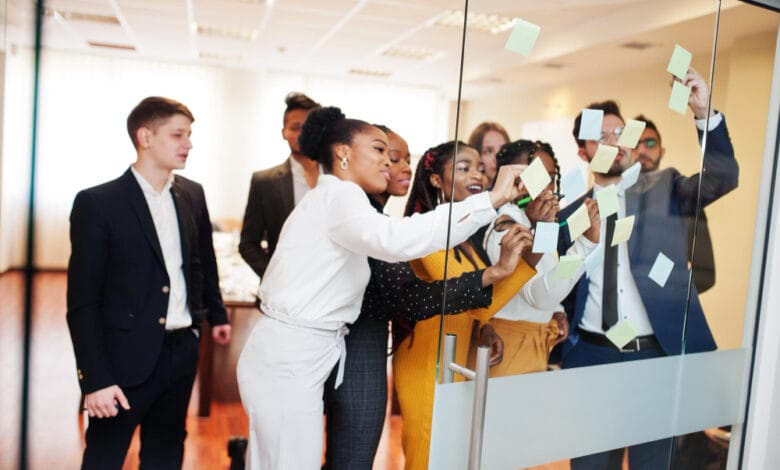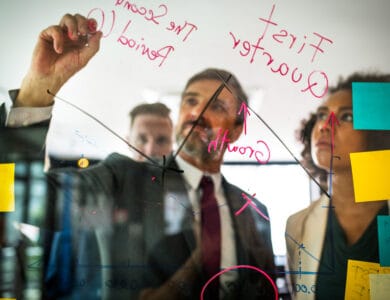12 Innovative Event Ideas for Company Productivity to Hit Goals

Need help to maintain team momentum while chasing those ambitious company goals? In today’s hybrid work environment, traditional meetings and team activities often need to be more balanced, leaving employees disengaged and productivity stagnating. Your team’s potential remains to be tapped, and those quarterly targets seem increasingly challenging to reach.
Creative Event Ideas for Company Success Without Breaking the Bank
But here’s the game-changer; Innovative event ideas for company productivity aren’t just about fun; they’re strategic catalysts for success. From goal-setting hackathons to cross-department collaboration days, this guide reveals 12 proven event ideas that transform team dynamics, boost productivity, and create lasting impact. Ready to turn your company events into powerful drivers of achievement?
1. Goal-Setting Hackathons
Transform your traditional planning sessions into dynamic Goal-Setting Hackathons – an innovative approach that turns strategy meetings into engaging, results-driven events. Think of it as a productivity sprint where teams come together with purpose, energy, and a clear mission to map out their path to success. For a deeper dive into organizing these transformative events, check out our guide on Transform Your Teams: 9 Strategic Steps to Plan Goal-Setting Hackathons.
Breaking away from conventional quarterly reviews, these structured 1-2 day sessions empower cross-functional teams to collaborate intensively on defining and achieving their objectives. Your teams work together using design thinking methodologies, ensuring every voice is heard and every perspective considered. As one of the most effective event ideas for company productivity, Goal-Setting Hackathons create an environment where innovation meets execution.
The magic lies in the structure: regular checkpoint presentations keep teams accountable and aligned, while the intensive format prevents the usual planning fatigue. Teams emerge with concrete action plans, clearly defined KPIs, and – most importantly – a shared vision of success. The outcome? A roadmap that’s not just ambitious but achievable, with every team member understanding their role in the bigger picture.
2. Skills Exchange Summit
While Goal-Setting Hackathons lay the foundation for success, unlocking your team’s full potential requires tapping into the wealth of knowledge already present within your organization. Enter the Skills Exchange Summit – a dynamic conference-style event that transforms employees into both teachers and learners.
This innovative approach to professional development stands out among top event ideas for company productivity because it recognizes that every team member brings unique expertise to the table. Through carefully curated learning tracks, employees share both technical prowess and essential soft skills, creating a rich tapestry of knowledge exchange that benefits the entire organization.
What sets these summits apart is their practical, hands-on approach. Instead of passive learning, participants engage in interactive workshops where they can immediately apply new skills. Multiple learning tracks ensure everyone finds relevant content, while session recordings create a valuable knowledge library for future reference. The result? A self-sustaining ecosystem of continuous learning that drives both individual growth and organizational success.
3. Innovation Labs
Building on the collaborative spirit of Skills Exchange Summits, Innovation Labs take teamwork to new heights by creating dedicated spaces where creativity meets real-world problem-solving. These dynamic sessions transform everyday business challenges into opportunities for breakthrough solutions.
Innovation Labs stand out as one of the most transformative event ideas for company productivity because they bridge the gap between ideation and implementation. Teams come together in diverse groups, bringing different perspectives and expertise to tackle pressing business challenges. With direct mentorship from leadership, ideas evolve from concepts to actionable plans.
What makes these labs truly effective is their focus on real, immediate challenges rather than hypothetical scenarios. Teams work on actual company problems, ensuring that every minute spent brainstorming translates into potential business value. Each lab session follows a structured approach: problem presentation, team formation, guided ideation, and – most crucially – detailed implementation planning. The result? Solutions that don’t just look good on paper but are ready to be put into action.
If you are looking for some Innovative Festive Celebrations to Boost Employee Morale and Team Spirit, check out our 7 Unique Holiday Work Event Ideas That Your Team Will Love

4. Productivity Sprints
While Innovation Labs excel at generating solutions, turning those ideas into reality requires focused execution. That’s where Productivity Sprints shine – structured periods of intense, distraction-free work that transform ambitious projects into completed achievements.
These focused work sessions have become one of the most practical event ideas for company productivity, especially when teams need to move from ideation to implementation quickly. By creating a dedicated environment where interruptions are minimized and objectives are crystal clear, teams can achieve in days what might otherwise take weeks.
The beauty of Productivity Sprints lies in their simple yet powerful structure. Each sprint begins with clearly defined goals, creating a shared sense of purpose. Teams work in focused blocks, maintaining momentum through regular progress check-ins that keep everyone aligned and motivated. The elimination of typical workplace distractions – from unnecessary meetings to constant email notifications – creates a sanctuary for deep work and meaningful progress.
At the sprint’s conclusion, teams gather to celebrate their achievements, reinforcing the connection between focused effort and tangible results. This celebration isn’t just about recognition – it’s about building a culture where productivity is both valued and rewarded, inspiring teams to maintain their momentum long after the sprint ends.
5. Cross-Department Collaboration Days
Following the focused intensity of Productivity Sprints, organizations need opportunities to break down departmental barriers and create lasting connections. Cross-department collaboration Days serve as strategic bridges, bringing together diverse teams to tackle shared challenges and create innovative solutions that span the entire organization.
These collaborative sessions rank high on the list of essential event ideas for company productivity because they address a fundamental business challenge: departmental silos. By creating mixed-department teams and focusing on shared objectives, these events foster genuine connections that transform how work flows through the organization.
The key to successful collaboration days lies in their thoughtful structure. Teams come together around real business challenges that affect multiple departments, creating natural opportunities for meaningful interaction. Rather than forcing artificial networking, these events encourage authentic relationship-building through shared problem-solving and mutual discovery. Each team documents its collaborative outcomes, creating valuable references for future cross-departmental projects.
The ripple effects continue long after the event ends. New communication channels emerge interdepartmental processes become more streamlined, and teams develop a deeper appreciation for their colleagues’ expertise. This improved organizational alignment doesn’t just boost efficiency – it creates a more connected, innovative workplace where great ideas can flow freely across traditional boundaries.
6. Wellness and Productivity Workshops
While Cross-Department Collaboration Days strengthen organizational bonds, sustaining this momentum requires a holistic approach that prioritizes both performance and well-being. Wellness and Productivity Workshops address this crucial balance, offering a comprehensive framework for sustainable success in today’s demanding business environment.
These workshops represent a vital evolution in event ideas for company productivity, recognizing that peak performance isn’t about pushing harder – it’s about working smarter while maintaining mental and physical health. Through carefully crafted sessions, employees learn to blend productivity techniques with wellness practices, creating sustainable routines that prevent burnout.
Each workshop combines practical time management strategies with essential mindfulness practices. Participants learn evidence-based stress management techniques they can immediately apply to their daily work. From quick meditation breaks between tasks to structured time-blocking methods, these tools help teams maintain focus without sacrificing their well-being.
The workshops go beyond theory by providing tangible resources and ongoing support. Employees receive access to productivity apps, guided meditation recordings, and stress-management toolkits. Regular follow-up sessions ensure these practices become embedded in the company culture, creating a workplace where high performance and personal wellness aren’t just compatible – they’re inseparable partners in long-term success.
Further reading: Check this 9 Inspiring Community Wellness Event Ideas to Strengthen Bonds

7. Data-Driven Decision Making Games
Moving from wellness-focused initiatives to strategic skill development, Data-Driven Decision Making Games add an exciting competitive element to professional growth. These interactive events transform complex data analysis into engaging challenges that sharpen analytical thinking while driving better business outcomes.
When considering powerful event ideas for company productivity, these data-focused games stand out for their ability to make metrics analysis both accessible and engaging. Teams compete in multiple rounds, using real company data to make strategic decisions, with each round building upon lessons learned from the previous one.
The genius of these games lies in their practical application of real-world scenarios. Teams work with actual company data and industry-relevant situations, using professional data visualization tools to uncover insights and patterns. Each decision round presents new challenges, requiring teams to adapt their strategies based on previous outcomes. This iterative process builds confidence in handling complex data while developing crucial analytical skills.
What makes these games truly valuable is the collaborative analysis that follows each round. Teams come together to examine their decision-making processes, sharing insights about what worked and what didn’t. These discussions create a shared understanding of how data can inform better business decisions, fostering a culture where analytical thinking becomes second nature to everyday operations.
8. Virtual Team Building Olympics
While data-driven games excel at building analytical skills in person, today’s hybrid workplace demands equally engaging remote experiences. Virtual Team Building Olympics answer this need, transforming online collaboration into an exciting competition that strengthens team bonds across digital spaces.
As one of the most adaptable event ideas for company productivity, these virtual Olympics create an inclusive environment where remote and office-based employees compete and collaborate on equal footing. Through a carefully curated mix of synchronous and asynchronous challenges, teams develop stronger connections while mastering essential virtual collaboration tools.
The Olympic format combines productive skill-building with genuine entertainment. Teams might race to complete a collaborative presentation, compete in virtual escape rooms, or work together on digital problem-solving challenges. Each activity is designed to be accessible across time zones and technology comfort levels, ensuring everyone can participate fully.
Success lies in the strategic balance of competition and collaboration. While teams compete for points and recognition, the real victory comes from improved virtual communication skills and stronger remote working relationships. The Olympics conclude with a virtual awards ceremony that celebrates both winning teams and individual achievements, reinforcing the connection between remote collaboration and organizational success.
9. Customer Experience Simulations
Taking the interactive spirit of Virtual Team Building Olympics into the customer service realm, Customer Experience Simulations create eye-opening opportunities for teams to walk in their customers’ shoes. These immersive role-playing events transform abstract customer feedback into tangible experiences that drive meaningful service improvements.
Standing out as one of the most impactful event ideas for company productivity, these simulations revolutionize how teams understand and respond to customer needs. Through carefully crafted scenarios based on real customer journeys, employees experience firsthand the challenges, frustrations, and delight points that shape customer satisfaction.
Each simulation session begins with teams stepping into customer roles, navigating through common service interactions while their experiences are recorded for analysis. The real learning happens during the review phase, where teams dissect these recordings, identifying both pain points and moments of excellence. This deep analysis leads to practical insights that teams can immediately apply to their daily work.
The final phase focuses on turning insights into action. Teams collaborate to develop specific improvement plans, setting measurable goals for enhancing customer experience. Regular follow-up sessions track progress and celebrate improvements, creating a continuous feedback loop that keeps customer-centric thinking at the heart of daily operations.
10. Agile Methodology Games
Building on the practical insights gained from Customer Experience Simulations, Agile Methodology Games take workflow optimization to the next level. These interactive events transform complex project management concepts into engaging, hands-on experiences that make agile principles accessible to everyone on your team.
As innovative event ideas for company productivity, these games break down traditional barriers to agile adoption through playful yet purposeful activities. Teams learn essential concepts like sprint planning, daily stand-ups, and retrospectives through carefully designed simulations that mirror real workplace challenges.
The magic happens when teams tackle actual project scenarios using popular agile frameworks. Through structured exercises, participants experience how agile methods can streamline their daily work processes. Whether it’s a modified version of the “Ball Point Game” to demonstrate flow efficiency or a custom-designed “Sprint Simulation” that showcases the power of iterative development, each activity reinforces key agile principles.
Success metrics are built into every game, allowing teams to measure their improvement over time. Participants track progress through quantifiable indicators like cycle time reduction and team velocity improvements. These measurements create a clear connection between the games’ lessons and real-world productivity gains, helping teams understand how agile principles can revolutionize their actual project workflows.

11. Future Vision Workshops
While Agile Methodology Games optimize current processes, Future Vision Workshops push teams to look beyond immediate horizons. These forward-thinking sessions bring together industry experts and internal talent to map out tomorrow’s opportunities and prepare for upcoming challenges.
These workshops represent strategic event ideas for company productivity that focus on long-term success rather than quick wins. Through structured scenario planning exercises, teams explore potential future states of their industry, identifying emerging trends and technological shifts that could reshape their business landscape.
Each workshop session combines expert insights with hands-on planning activities. Industry leaders share their perspectives on upcoming trends, while teams work through carefully designed scenarios that challenge their assumptions about the future. This combination of external expertise and internal innovation creates a rich environment for strategic thinking and creative problem-solving.
The true value emerges in the creation of action roadmaps. Teams don’t just discuss future possibilities – they develop concrete plans to address them. These roadmaps outline specific steps, technological investments, and capability development needed to stay ahead of industry changes. Regular review sessions ensure these plans remain dynamic and responsive to evolving market conditions, turning future-focused insights into present-day competitive advantages.
12. Productivity Tool Olympics
Moving from future planning to present-day mastery, Productivity Tool Olympics transforms essential software training into an exciting competition. These events turn routine tool adoption into engaging challenges that accelerate learning while building confidence across all skill levels.
As one of the most practical event ideas for company productivity, these Olympics create an environment where learning happens naturally through friendly competition. Teams tackle real-world challenges using the organization’s essential productivity tools, from project management platforms to collaboration software, with different difficulty levels ensuring everyone can participate meaningfully.
Each Olympic event focuses on specific tools critical to daily operations. Beginners might start with basic features, while advanced users tackle complex automation challenges. The competitive format encourages participants to explore tool capabilities they might otherwise overlook, leading to discoveries that streamline their daily workflows.
Success comes from the careful balance of challenge and support. Comprehensive reference materials guide participants through each task, while expert mentors provide tips and troubleshooting help. The Olympics conclude with a showcase where teams demonstrate their most innovative solutions, creating a valuable knowledge base of productivity hacks and best practices that continue to benefit the organization long after the competition ends.
Frequently Asked Questions
Planning Your Productivity Events
Q1: What’s the optimal frequency for organizing productivity events?
Strategic timing is crucial for event success. Schedule major productivity initiatives quarterly to maintain steady progress, while running smaller-scale events monthly. This balanced approach keeps teams engaged without overwhelming their regular workflows.
Q2: How do we track the effectiveness of these events?
Success measurement requires a multi-faceted approach:
- Compare productivity metrics before and after events
- Analyze feedback through employee satisfaction surveys
- Track progress on team and individual goals
- Monitor how frequently new skills appear in daily work
- Document improvements in team efficiency over time
Q3: What duration works best for different event types?
Each event type has its optimal timeframe:
- Goal-Setting Hackathons: A focused 1-2 day deep dive
- Skill-Building Workshops: Intensive 2-4 hour sessions
- Professional Training: Concentrated 1-2 hour blocks
- Productivity Sprints: Immersive 3-5 day experiences
Q4: What strategies ensure high participation rates?
Drive engagement through strategic planning:
- Share clear value propositions upfront
- Design inclusive, accessible events
- Create flexible attendance options
- Enable seamless remote participation
- Establish meaningful recognition systems
- Provide concrete post-event action steps
Enhance your productivity events with tools like Miro for brainstorming and collaboration or Trello to streamline project management and execution.
Conclusion
The path to enhanced productivity lies in thoughtful event selection and implementation. When organizations align these innovative activities with their unique culture and goals, they create lasting impact. Success comes from careful customization, balanced engagement, and consistent measurement. Through strategic implementation, these events become catalysts for organizational growth, fostering a culture where productivity naturally flourishes.



